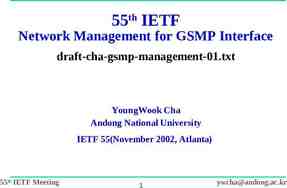“BABEŞ-BOLYAI” UNIVERSITY, CLUJ-NAPOCA FACULTY OF HISTORY AND
24 Slides355.50 KB

“BABEŞ-BOLYAI” UNIVERSITY, CLUJ-NAPOCA FACULTY OF HISTORY AND PHILOSOPHY INSTITUTE FOR INTERNATIONAL STUDIES Intercultural communication in managing global interdependence Vasile PUŞCAŞ, PhD International Congress on „Soft Power”, Cultural Diplomacy and Interdependence Belin, November 6th – 9th 2009

I. Contemporary international system The fall of the Berlin Wall, generated the conditions for re-structuring the international system. Removing the wall between East and West Berlin, represented the signal for Germany’s reunification but also the break down of European barriers. From this moment on, the international system had been in a continuous process of changing The changes generated by the fall of the Berlin Wall created a huge window of opportunity. International Congress on „Soft Power”, Cultural Diplomacy and Interdependence Belin, November 6th – 9th 2009

I. Contemporary international system Our contemporary world can be imagined as a spider web system, typified interdependent network. by a growing There are two basic characteristics that are re- shaping the contemporary international system: the dynamics of distribution of power and the deepening of global interdependence. International Congress on „Soft Power”, Cultural Diplomacy and Interdependence Belin, November 6th – 9th 2009

II. Interdependence Interdependence is high and implies strategic interactions among entities that are not arranged in formal hierarchies. Interdependence can be defined as “situations in which actors or events in different parts of a system affect each other”. (R.O. Keohane, J. Nye, 1977). Today interdependence in the international system is managed through the creation and development of inter-governmental and international institutions. International Congress on „Soft Power”, Cultural Diplomacy and Interdependence Belin, November 6th – 9th 2009

II. Interdependence Managing interdependence means to break down the barriers of communication between cultures, between various sectors of the international system, between societies and especially building a common language for dealing with interdependence. International Congress on „Soft Power”, Cultural Diplomacy and Interdependence Belin, November 6th – 9th 2009

III. Intercultural communication in managing global interdependence Economic change An increased appreciation by companies that managing cultural differences properly can be a key factor in getting things done effectively across borders. There is a growing demand for businesses to understand and manage the diverse values, perceptions, business worldviews and behaviour of corporations, staff, and its customers. International Congress on „Soft Power”, Cultural Diplomacy and Interdependence Belin, November 6th – 9th 2009

III. Intercultural communication in managing global interdependence Changes in the personal lifestyle These changes ask for intercultural communication in developing skills and tools to manage differences creatively. International Congress on „Soft Power”, Cultural Diplomacy and Interdependence Belin, November 6th – 9th 2009

III. Intercultural communication in managing global interdependence Institutional change The increasing prominence government networks of transnational Therefore, problem solving very often means international cooperation and coordination in the framework of the light multilateralism. Intercultural communication contributes to the protection of human rights and spreads democracy, good governance and the rule of law. International Congress on „Soft Power”, Cultural Diplomacy and Interdependence Belin, November 6th – 9th 2009

III. Intercultural communication in managing global interdependence Institutional change Actors of the international system make use of intercultural communication as instrument for creating an international institutional framework in pursuing their interests and achieving their goals at a global level. The actors of the international system are harmonizing their interests by adopting intercultural communication codes: agreements, treaties, protocols etc. International Congress on „Soft Power”, Cultural Diplomacy and Interdependence Belin, November 6th – 9th 2009

III. Intercultural communication in managing global Therefore, meeting the challenges of interdependence global governance implies intercultural communication in: building capacity for governance and increasing partner countries' input into the formulation of the relevant reform programs; ensuring synergy and consistency between the various instruments and policies; reinforcing the development of partnerships with a view to achieving coordination between donors' priorities and partner countries' agendas by means of policy dialogue, as well as complementarities between fund providers. International Congress on „Soft Power”, Cultural Diplomacy and Interdependence Belin, November 6th – 9th 2009

IV. Europe and the intercultural communication European Union a model of efficient intercultural communication in interdependence management. Managing the intercultural communication in EU means: managing “cultural diversity” the ability to experiment with new forms of governance for the Member States and their regions a further developing of their policies in these areas with reference to common objectives a close engagement in dialogue with EU institutions and support for the development of new EU policies and actions, as well as developing dialogue among themselves; a renewed sense of partnership and ownership of EU action to achieve these objectives. building the EU identity, Europeans share not only common values, a common history, but also a common future in the integration process. promoting the European Public Space International Congress on „Soft Power”, Cultural Diplomacy and Interdependence Belin, November 6th – 9th 2009

IV. Europe and the intercultural communication Council of Europe defined the intercultural dialog/communication as ‘a process that comprises an open respectful exchanges of views between individual and groups with different ethnic, cultural, religious and linguistic backgrounds and heritage, on the basis of mutual understanding and respect’. International Congress on „Soft Power”, Cultural Diplomacy and Interdependence Belin, November 6th – 9th 2009

IV. Europe and the intercultural communication Council of Europe Promotes five interrelated dimensions to the management of intercultural dialog/communication: democratic governance of cultural diversity; democratic citizenship and participation; learning and teaching intercultural competences; space for intercultural dialog; intercultural communication in international relations. International Congress on „Soft Power”, Cultural Diplomacy and Interdependence Belin, November 6th – 9th 2009

IV. Europe and the intercultural communication International Congress on „Soft Power”, Cultural Diplomacy and Interdependence Belin, November 6th – 9th 2009

The V. Main goals of managing interdependence and intercultural communication strategic international management deals with the globalization vs. national responsiveness issue. The international management also emphasizes that two forces are at work: globalization (borderless economics) and diverse cultures. Big market players must take in consideration the reality of national cultures which greatly affect organizational culture. The main objective of international communication is creating competitive advantages International Congress on „Soft Power”, Cultural Diplomacy and Interdependence Belin, November 6th – 9th 2009

V. Main goals of managing interdependence and intercultural communication communication Intercultural transforms/converts local traditions, values and norms in resources and capabilities that enhance global competitiveness. The aim of intercultural communication is to transform certain differences and cultural diversity into positive factors for the global development of companies and, correspondingly, for the promotion of economical development in a larger number of host countries and regions. International Congress on „Soft Power”, Cultural Diplomacy and Interdependence Belin, November 6th – 9th 2009

V. Main goals of managing interdependence and intercultural communication Intercultural communication develops competitiveness by several means as: understanding the worldwide political, cultural and business environment from a global perspective; developing multiple cultural perspectives and approaches to conducting business; being skilful at working with people from many cultures simultaneously; adapting comfortably to living in different cultures; learning to interact with international partners as equals. International Congress on „Soft Power”, Cultural Diplomacy and Interdependence Belin, November 6th – 9th 2009

International Congress on „Soft Power”, Cultural Diplomacy and Interdependence Belin, November 6th – 9th 2009

V. Main goals of managing interdependence and intercultural communication The effectiveness of every international negotiation depends on intercultural skills, such as: understanding barriers to cross-cultural communication and intercultural communication; analyzing the Weltanschauung of the negotiation partner; forecasting the impact of communication message that touch core values of the other cultures; understand what behaviours can damage or increase negotiation effectiveness across cultures; defining the action line International Congress on „Soft Power”, Cultural Diplomacy and Interdependence Belin, November 6th – 9th 2009

Conclusions In the recent years practitioners in a wide variety of fields—scientific cooperation, academic research, business, management, education, health, culture, politics, diplomacy, development, and others—have realized just how important intercultural communication is for their everyday work. The management of cultural diversity deals with the issue of sensible adaptation to others and also efforts to establish common ground. International Congress on „Soft Power”, Cultural Diplomacy and Interdependence Belin, November 6th – 9th 2009

Conclusions Interdependence poses problems of coordination, emphasises the interests within countries, and initiates transnational coalitions, often linked to the activities of intergovernmental institutions. An efficient management of global interdependence relies on intercultural communication and on its capability of perpetually renewing itself in concordance with these new challenges. , interdependence was related to the economy, today we can easily say that it comprises the reciprocal perception of partners: (cultural) identity, harmonisation, communicational interaction, the study of competitive and cooperative behaviour. International Congress on „Soft Power”, Cultural Diplomacy and Interdependence Belin, November 6th – 9th 2009

Conclusions This is why intercultural communication is an important tool in general management of global interdependences. Intercultural communication in managing interdependences can be more of a mean for exchanging information, can build collaboration and even conflict mediation. International Congress on „Soft Power”, Cultural Diplomacy and Interdependence Belin, November 6th – 9th 2009

Conclusions Hans J. Kleinstenberg’s typology of different version of international communication: a.) glocal communication; b.) intercultural communication; c.) transcultural communication. In order to avoiding the domination of the market, it is necessary to strenghten the two other types of actors – intercultural and transcultural International Congress on „Soft Power”, Cultural Diplomacy and Interdependence Belin, November 6th – 9th 2009

Conclusions „That active policy has to concentrate on the revival of intercultural as well transcultural activities in the world.” Why? Because international cultural relations is a resource for power in international relations .“ (Alleyne, 1995). International Congress on „Soft Power”, Cultural Diplomacy and Interdependence Belin, November 6th – 9th 2009






